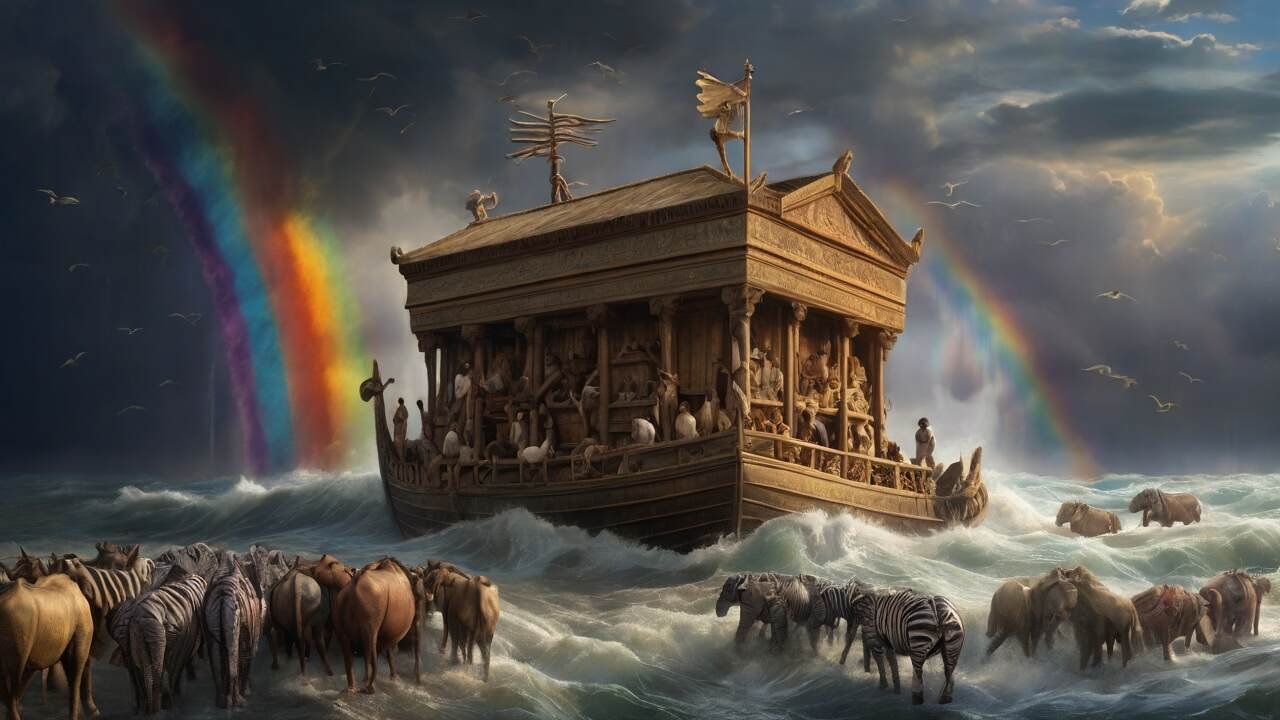For Christians, belief in the afterlife is a central tenet of their faith. Rooted in the resurrection of Jesus Christ, the Christian understanding of life after death offers a message of hope, restoration, and eternal communion with the divine. This profound belief in the afterlife shapes the way Christians approach the realities of mortality, imbuing their lives with a greater sense of purpose and meaning.
At the heart of the Christian afterlife is the conviction that physical death is not the end, but rather a gateway to a higher, more enduring state of being. Through the sacrifice and triumph of Jesus, Christians believe that the relationship between God and humanity has been restored, opening the door to the promise of eternal life in the presence of the divine.
The Christian faith also grapples with the concept of divine justice, teaching that those who have lived righteous lives will be rewarded with the bliss of Heaven, while those who have rejected God’s grace will face the consequences of eternal separation in Hell. Some Christian denominations, such as Catholicism, also recognize the idea of Purgatory, a state of purification before entering the celestial realm.
Key Takeaways
- Christians’ beliefs about the afterlife are centered on the resurrection of Jesus Christ.
- The Christian faith teaches that physical death is not the end, but a gateway to eternal life in the presence of God.
- Heaven is viewed as the ultimate reward for those who have lived righteous lives, while Hell represents eternal separation from God.
- Some Christian denominations also recognize the concept of Purgatory, a state of purification before entering Heaven.
- The Christian belief in the afterlife imbues life with a greater sense of purpose and meaning, offering hope beyond the limitations of mortality.
Introduction: Facing Death with Hope
Death is an unavoidable reality that all humans must confront. The finality of death can be a difficult and daunting prospect, leaving many to grapple with the human longing for eternity and a continued existence beyond the physical world. However, for those who hold the Christian faith, the hope in the afterlife can provide comfort and meaning in the face of mortality.
The Reality of Death and the Human Longing for Eternity
Throughout human history, the human longing for eternity has been a central theme. Across cultures and belief systems, people have sought to find solace in the idea of life after death, a realm where the soul can continue to exist and thrive. This deep-seated desire to transcend the boundaries of mortal existence is a testament to the human spirit’s innate search for meaning and purpose in the face of facing death.
“It is not death that a man should fear, but he should fear never beginning to live.” – Marcus Aurelius
The Christian faith offers a unique perspective on this universal human longing. By embracing the promise of hope in the afterlife, believers find solace in the belief that death is not the end, but rather a gateway to eternal life in the presence of God. This hope in the afterlife provides a profound source of comfort and strength in the face of the inevitable.
As we navigate the complexities of facing death, it is essential to recognize the deep-seated human longing for eternity that lies within us all. By embracing the hope in the afterlife that the Christian faith offers, we can find the courage and resilience to face life’s final chapter with grace and purpose.
The Resurrection Hope: Life After Life After Death
The foundation of Christian hope in the afterlife is rooted in the belief in the resurrection of Jesus Christ. Christians believe that Jesus’ resurrection from the dead not only demonstrates the power of God to overcome death but also serves as the “firstfruits” of the resurrection of all believers.
Jesus’ Resurrection: The Firstfruits of Our Resurrection
The resurrection of Jesus is the cornerstone of the Christian faith. As the Apostle Paul declares, “If Christ has not been raised, your faith is futile, and you are still in your sins” (1 Corinthians 15:17). Christians believe that just as Jesus’ resurrection has conquered death, so too will the bodies of all who trust in Christ be raised to new life at His return.
“But in fact Christ has been raised from the dead, the firstfruits of those who have fallen asleep.” (1 Corinthians 15:20)
The Promise of Bodily Resurrection at Christ’s Return
The promise of a bodily resurrection at the second coming of Christ is a central tenet of Christian theology, offering the hope of a restored and redeemed physical existence in the new heavens and new earth. This belief in the resurrection hope is not merely a spiritual or metaphorical reality, but a tangible promise of the restoration of the entire created order, including our physical bodies.
As the Apostle Paul writes, “For since we believe that Jesus died and rose again, even so, through Jesus, God will bring with him those who have fallen asleep” (1 Thessalonians 4:14). This bodily resurrection will be the culmination of God’s redemptive work, ushering in a new era of transformed creation where death and decay will be no more.
Bodily and Earthly Hope: A Redeemed Creation
The Christian faith holds a profound and distinctive view of the afterlife, rejecting the Gnostic notion that the physical, bodily existence is something to be discarded in favor of a higher spiritual plane. Instead, Christianity affirms the inherent goodness of physical existence and the earth, which was originally created good by God. This belief in the redemption and restoration of the physical world is a key aspect of the Christian understanding of the afterlife.
The Goodness of Physical Existence and the Earth
The Bible affirms the fundamental goodness of the physical world, including our bodily existence. God created the earth and declared it “very good” (Genesis 1:31), and the incarnation of Jesus Christ – God becoming fully human – is a powerful statement of the worth and dignity of the physical realm. Christians believe that the earth, and the human body, are not inherently evil or flawed, but rather are part of God’s good creation, marred by sin but destined for redemption and restoration.
Work and Dominion in the New Heavens and New Earth
The Christian vision of the afterlife includes the promise of a new heavens and new earth, where the redeemed will continue to work and exercise dominion, fulfilling the original mandate given to humanity in the Garden of Eden (Genesis 1:28). This hope in a renewed and restored physical existence, where we can continue to steward and cultivate the earth, is a vital component of the Christian understanding of the afterlife.
Rather than seeking to escape the material world, the Christian hope is for the bodily and earthly hope of a redeemed creation, where we can fully embrace the physical existence and the earth, engaging in meaningful work and dominion within the new heavens and new earth.
“Then I saw a new heaven and a new earth, for the first heaven and the first earth had passed away, and the sea was no more.” (Revelation 21:1)
How do Christians View the Afterlife?
Christians hold a diverse range of beliefs about the afterlife, yet there are some core tenets that are widely accepted. The concept of heaven as an eternal dwelling in the presence of God is central to the Christian faith, while the idea of hell as a place of eternal separation from God is also widely embraced.
Some Christian denominations, such as Catholicism, also incorporate the notion of purgatory, a state of purification after death before entering heaven. This belief in purgatory serves as an intermediate step for those who are not yet fully prepared to dwell in the presence of God.
A fundamental element of the Christian hope in the afterlife is the promise of bodily resurrection at the second coming of Christ. This belief in the resurrection of the body is rooted in the resurrection of Jesus Christ, which Christians see as the “firstfruits” of the resurrection to come.
| Christian Afterlife Beliefs | Description |
|---|---|
| Heaven | The eternal dwelling in the presence of God |
| Hell | The place of eternal separation from God |
| Purgatory | An intermediate state of purification before entering heaven (in some Christian denominations) |
| Bodily Resurrection | The promise of the resurrection of the body at the second coming of Christ |
These diverse Christian views on the afterlife, ranging from the promise of heaven to the reality of hell and the concept of purgatory, all point to the central Christian hope in the ultimate defeat of death and the restoration of all things through the power of the resurrection.
Redemption Hope: The Defeat of Death and All Its Ills
For Christians, the belief in the afterlife is not merely about the salvation of the individual soul. It encompasses a grander vision of the redemption hope – the defeat of death and the restoration of all things. The resurrection of Christ is seen as the beginning of the overthrow of the broken world order ruled by sin, suffering, and mortality.
The Overthrow of the Broken World Order
Through the triumph of Christ over the grave, Christians believe that the corrupted, fallen world order is being dismantled. Death, the last enemy, will ultimately be defeated. The apostle Paul declared, “O death, where is your victory? O death, where is your sting?” (1 Corinthians 15:55). This hope in the defeat of death is central to the Christian vision of the afterlife.
The Restoration of All Things
Beyond the individual’s eternal destiny, Christians look forward to the day when Christ will return and bring about the restoration of all things. They envision a new heaven and new earth, where righteousness and justice will dwell, and the brokenness of this world order will be mended. “For the creation waits with eager longing for the revealing of the sons of God… that the creation itself will be set free from its bondage to corruption and obtain the freedom of the glory of the children of God.” (Romans 8:19-21).
This redemption hope – the defeat of death and the restoration of all things – is a crucial aspect of the Christian’s belief in the afterlife. It transcends individual salvation and speaks to the transformative power of the gospel, which promises to heal the wounds of this broken world order and usher in a new era of hope, restoration, and wholeness.
“For the creation waits with eager longing for the revealing of the sons of God… that the creation itself will be set free from its bondage to corruption and obtain the freedom of the glory of the children of God.” (Romans 8:19-21)
The Intermediate State: Present with the Lord
While the ultimate hope for Christians is the bodily resurrection and the life of the world to come, the Bible also speaks of an intermediate state between death and the final resurrection. This is described as a state where the soul is “present with the Lord,” though not yet fully embodied. Christians find comfort in the idea that their loved ones who have passed away are now in the presence of God, even as they await the final restoration of all things.
The intermediate state is a time of waiting and anticipation, a transitional phase between the end of earthly life and the beginning of the eternal life to come. During this period, the souls of believers are said to be “present with the Lord,” enjoying a state of conscious fellowship with God while their physical bodies await the resurrection.
“We are confident, I say, and would prefer to be away from the body and at home with the Lord.” (2 Corinthians 5:8)
This belief in the intermediate state provides comfort and hope to Christians who have lost loved ones. It assures them that their departed friends and family members are now in the loving presence of God, even as they look forward to the day when they will be reunited with them in the afterlife of the new creation.

The intermediate state is a crucial part of the Christian understanding of the afterlife, bridging the gap between death and the final resurrection. It offers a glimpse of the eternal life to come, where believers will be fully reunited with their loved ones and with the Lord, never to be parted again.
Conclusion: The Ultimate Reunion and Wholeness
The Christian hope in the afterlife is ultimately one of reunion and wholeness. The promise of resurrection and the restoration of all things offers the reassurance that not only will believers be reunited with their loved ones, but that the entire created order will be made whole and at peace in the presence of God. This vision of the afterlife provides comfort, meaning, and an enduring hope in the face of death and the brokenness of the present world.
As we grapple with the reality of death, the Christian faith offers a profound and transformative perspective. The assurance of bodily resurrection and the reconciliation of all things under Christ’s reign inspires a deep longing for the ultimate reunion and wholeness that awaits. This hope extends beyond the individual to encompass the restoration of the entire created order, where the brokenness and ills of the present will be vanquished, and peace, harmony, and the presence of God will reign supreme.
In the face of life’s uncertainties, the Christian hope in the afterlife shines as a beacon of certainty, guiding us through the shadows of mortality. It is a promise of a future where the deepest yearnings of the human heart will be fulfilled, where loved ones will be reunited, and where the entirety of God’s creation will be restored to its original, unblemished state. This is the ultimate hope that sustains and inspires the Christian faithful, offering a vision of wholeness and reunion that transcends the limits of the present.
FAQ
How do Christians view the afterlife?
Christians believe that although physical death still occurs, those who believe in Christ and live good lives will be given eternal life in Heaven, which is seen as an eternity in the presence of God. The Christian faith also teaches about the concept of Hell, which is viewed as the opposite of Heaven, a place of eternal separation from God. Some Christian denominations, like Catholicism, also believe in Purgatory, a state of purification after death before entering Heaven.
What is the foundation of Christian hope in the afterlife?
The foundation of Christian hope in the afterlife is rooted in the belief in the resurrection of Jesus Christ. Christians believe that Jesus’ resurrection from the dead not only demonstrates the power of God to overcome death but also serves as the “firstfruits” of the resurrection of all believers. The promise of a bodily resurrection at the second coming of Christ is a central tenet of Christian theology, offering the hope of a restored and redeemed physical existence in the new heavens and new earth.
How do Christians view the physical existence and the earth?
The Christian vision of the afterlife rejects the Gnostic idea that the physical, bodily existence is something to be shed in favor of a higher spiritual plane. Instead, Christianity affirms the goodness of physical existence and the earth, which was originally created good by God. The Bible promises a new heavens and new earth, where the redeemed will continue to work and exercise dominion, fulfilling the original mandate given to humanity in the Garden of Eden.
What is the Christian hope in the redemption and restoration of all things?
The Christian hope in the afterlife is not just about the individual’s eternal destiny but also the redemption and restoration of the entire created order. The resurrection of Christ is seen as the beginning of the overthrow of the “broken world order” ruled by sin, death, and all its ills. Christians look forward to the day when Christ will return and bring about the complete restoration of all things, ushering in a new heaven and new earth where righteousness dwells.
What is the “intermediate state” in Christian beliefs about the afterlife?
While the ultimate hope for Christians is the bodily resurrection and the life of the world to come, the Bible also speaks of an “intermediate state” between death and the final resurrection. This is described as a state where the soul is “present with the Lord,” though not yet fully embodied. Christians find comfort in the idea that their loved ones who have passed away are now in the presence of God, even as they await the final restoration of all things.








